Freezer-Burned: Tales of Interior Alaska
Posted March 7, 2021 at 5:00 am by Hayley Day
“Freezer-Burned: Tales of Interior Alaska” is a regular column on the San Juan Update written by Steve Ulvi.
The Confines of Heaven
The Alapah carves sinuous bends in a spacious valley side to side, flowing into the upper Kuuk River, a large tributary of the Yukon River whose milky waters bend west across the Interior of Alaska well to the south. Forty miles up the Alapah River (meaning ‘cold’ in Inupiaq) the cloak of boreal forest slowly gives out to a few dwarf spruce and poplar, wracked by decades of ecological struggle, marking the circumpolar northern tree-line. From there the river landscape is raw and angular, large boulders and gray talus slopes draping dark peaks, riparian willow and tundra margins.
The Alapah forks again and again, becoming a creek, smaller and steeper, falling from the rocky clefts of the Brooks Range that arcs across northern Alaska. Historian Bill Brown prosaically referred to this northern-most major mountain range on earth as a place of “gaunt beauty, tenuous life”.
Sitting at his rough table, strewn with maps and books, eased by the muffled song of rushing water as the Alapah mixed with the larger Kuuk, the last thing that Nathan Cutler fancied, as his arduous preparations for the onset of winter slowed, was to endure being alone at his remote cabin for several more months. But there was no way to change that situation now.
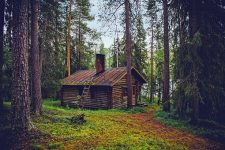 He was in a familiar state of limbo, cloud watching, awaiting winter storms to transform his world. Ice-building temperatures and especially blanketing snow, would enable him to expand his activities; there were loads of dry wood to drag in, water to haul and opening his established trapline trails in readiness for furbearer season openings. For now, he had time on his hands to tend to small tasks, rethink new marten lines and stew over the heart-wrenching loneliness to come. Looking up into the immense emptiness of the uncountable stars, separated by unimaginable empty distance, said to be expanding endlessly outward, fed his aloneness.
He was in a familiar state of limbo, cloud watching, awaiting winter storms to transform his world. Ice-building temperatures and especially blanketing snow, would enable him to expand his activities; there were loads of dry wood to drag in, water to haul and opening his established trapline trails in readiness for furbearer season openings. For now, he had time on his hands to tend to small tasks, rethink new marten lines and stew over the heart-wrenching loneliness to come. Looking up into the immense emptiness of the uncountable stars, separated by unimaginable empty distance, said to be expanding endlessly outward, fed his aloneness.
The solace of his winter occupation was always a welcome change from the frenetic, buggy, almost tiring light of summer. The down-shifting from “the sweet lie of summer” to the isolation of winter was rapid and unforgiving. Now his efforts and decisions, along with lady luck, were the sole arbiters of his success. Soon after arriving back at the Alapah, shouldering a 75-pound pack from Hendersen’s, he happily launched into cabin repairs, cutting dry wood and hunting caribou and bears, meat and fat, in his home country.
The boulder maze at the canyon just above Hendersen’s Bend, prevented the comparative ease and flexibility of river boat resupply and access to his cabin during summer. Rivers are the highways of the vast Interior. It also kept others out until the late winter when rivers were accessible to those capable of breaking trail in the deep snow laced with treacherous overflow under the frozen insulating cover. Some of the rough crew that worked for the Lucky Strike mine on the Yukon made spring trips riding powerful snow machines in order to camp, guzzle cheap liquor and poach game on the upper Kuuk. There had been several troubling incidents over the years. Lars Hendersen, standing up for his oldest daughter, had forced a confrontation that quickly turned ugly last spring.
As a hazy fog lifted a day after scheduled airdrops, a plane buzzed the cabin with a high decibel growl that would startle anyone but the dead. Grinning, Nate hurriedly threw on a coat and watch cap to trot the well-worn path to the margin of Swan Lake, where a nearly treeless tussock flat, of football field length, had approaches that allowed a small plane to slow, pull flaps, hang on the prop and airdrop his winter supplies in several roaring passes. His old Kelty pack frame and cordage was already there.
Waving his arms, glad that he had not missed watching the first pass, his friend and no-nonsense mentor, Lars, flew the Cessna 185 with the cargo door off, while one of his teenagers, heavily dressed for the windchill, worked in back as the “kicker”. The smoothest area within the dry sedge tussocks was marked by survey tape, but the slightest wind and vagaries of roaring by at 75 mph a couple hundred feet off the deck, always resulted in some bursting grain sacks (even triple bagged) and damage to more fragile supplies. A bombing run, really. There would be a sweet note and a treat from Lars’ wife Trudy.
Inexplicably, he had never located some bundled stovepipe he had watched fall a few years back. They had all heard the horror stories of attaching parachutes of some kind to dampen the velocity of supplies, but such finarky riggings could tangle on the plane’s tail feathers or tail wheel and cause a devastating crash.
Neck and back stiff after a day of packing the 800 pounds of scattered supplies, Nate awoke in the predawn hours, burritoed in a sleeping bag staring into the black void. There was little to hear other than his own breathing. His first feelings in cognitive surfacing were feelings of security and comfort, replenished food. His was a sturdy log cabin, grassy roofed, set in a forested peninsula between the rivers and the shallow lake, built by shared dreams and the boundless energy of young love, hardly ten years before.
But once his waking mind stirred, his conflicted memories flared to replay many tragic moments and failures of character. Certainly, happiness and satisfaction registered often in the daily course of things, but in a flashy, ephemeral way, diluted by the passage of time. Nate was plagued by a sadness and anger, fostered by corrosive family incidents during a troubled upbringing on the Yukon River outside of Eagle City.
He struggled with a brittle temper and his personality ‘quirks’ seemed to distill to greater potency as his years accumulated. His love for his long-suffering mother, now dead several years, was overshadowed by his contempt for his lying, fundamentalist father who had poisoned the young soul of his oldest son, with years of stress and anxiety. His youngest sister, Hannah had recently implied other psychologically destructive, unforgiveable distortions of parental nurturing in the years after Nate left for college.
Before deciding to take some college courses, he and a young friend had lived off the land for the better part of two years, channeling the lifeways of Rocky Mountain fur trappers, on a small tributary of the upper Yukon. He rarely visited his home and family. At the time he thought such a footloose, scoff-law life in the woods to be the ultimate outdoor experience, but now he thought differently.
The Alaska National Interest Lands Conservation Act of 1980, had been like a slow-motion meteor impact in altering much that was left of “Old Alaska”, creating strife and turmoil among Alaskans. Stories of motorized use closures, prohibition of long-standing sport hunting and guiding activities and restrictive cabin regulations were running hot and sparking like dry lightning across the huge state. In his eagerness to see more of the vast region of the upper Kuuk, recently designated in a National Park, and earn summer wages as a uniformed seasonal ranger, he recognized that it was a pact with the devil. Locally he was viewed contemptuously as a friggin’ turncoat.
His cabin (on a native allotment claimed by his ex-wife’s parents) as well as much of his winter trapline, along with the lifeways of many people he respected, were now in the slowly focusing, unpredictable policy crosshairs of the federal government. He had lost sleep for weeks while considering sending an application for a seasonal position. Eventually the scale of weighted values (and few other outdoorsy ways to make money) eventually tipped toward his concerns for the wider preservation issues of threatened landscapes.
When enjoying summer time off and unwinding at campfire gatherings in the bush enclave of Bettles, or even the outskirts of Fairbanks, he tried to avoid the inevitable venting and rumor-mongering that flared as the booze flowed. He was paid to deal with plenty of that when on duty. He couldn’t win, even efforts to be helpful by dissembling false rumors often resulted in angry words or worse. Many casual friendships imploded and personal threats were voiced. But he had chosen to put a target on his own back.
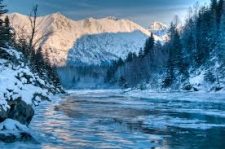 Like most men his age he took every opportunity to meet unattached women. When he did, he carefully shifted from the ‘who do you know, what do you do’ slow dance to casually describe his winter lifeway with boyish enthusiasm. Their reactions were cautiously set aside for future conversations. He knew better, as a result of confusing and painful experiences, than to even suggest a winter invite until there was a deeper emotional connection. Of course, a robust sexual relationship was a prerequisite to spending months together in a small cabin in the bush. Only then did he share his envelope of photos and a tattered, marked-up topo map of his beloved Alapah country
Like most men his age he took every opportunity to meet unattached women. When he did, he carefully shifted from the ‘who do you know, what do you do’ slow dance to casually describe his winter lifeway with boyish enthusiasm. Their reactions were cautiously set aside for future conversations. He knew better, as a result of confusing and painful experiences, than to even suggest a winter invite until there was a deeper emotional connection. Of course, a robust sexual relationship was a prerequisite to spending months together in a small cabin in the bush. Only then did he share his envelope of photos and a tattered, marked-up topo map of his beloved Alapah country
To Nate’s dismay, his efforts to attract a capable female partner failed in early September, with the deadlines for commitment looming. The two outdoorsy gals he had been courting all summer, declined his earnest invites to join him. He had been as honest as he dared. He knew well that it was a really big ask with unanticipated strains likely and mutual regret possible. Unresolved contention would create a kind of purgatory together for long hours in the cabin, while surrounded by a wild heaven.
Anna’s old boyfriend had returned unexpectedly, so that was that. He tried to keep himself from falling any further than he already had for Susan’s earthy charms and obvious abilities. Once emotionally attached it was always tough for him to disengage. As a summer river guide in the Brooks Range, she had long been interested in living out in the bush, seemed enthralled with the idea, but finally said tearfully that the commitment was just too steep and irrevocable. Perhaps next winter? She may have sensed that ghosts lingered. Perhaps someone had told her the story of his infant son’s tragic death on the trail that caused his wife to leave him and never return to the Alapah, as their joyous marriage shattered like a mirror of the past.
Nate was unable to rid himself of that intense sadness and guilt, that was always a dark shadow following his normally bright and energetic personality and confident ways. Some women could sense his conflicted emotions right away and it gave them pause when considering at least two months isolated at the Alapah cabin before the frozen river would even allow a retreat, or the usual holiday trek down to Hendersen’s.
Daily routines and outdoor work were essential in tamping melancholia. Same motions every morning this time of year; about six a.m. by the consensus of the two mechanical clocks he kept, the woodstove was rekindled, lamps lit and water on for coffee and washing up. Irregular AM radio reception allowed him to reset his wall calendar and clocks. There were still several hours until the first natural light of the day at the turn of the new year, a shade less than four hours of dim light if the skies were cerulean clear. The heavily forested valley floor would remain in indirect light and gloam for many weeks yet.
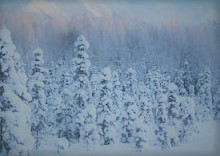 Reaching under the lower kitchen shelf, the cold storage spot, he pulled out a fat-encrusted caribou hind quarter from which to slice fry meat on a blood-stained piece of cardboard. Practiced knife strokes cut steaks and hammer blows to the leg bone revealed the succulent marrow. Nate paused to examine a flickering window reflection of himself looked back, bearded and unsmiling
Reaching under the lower kitchen shelf, the cold storage spot, he pulled out a fat-encrusted caribou hind quarter from which to slice fry meat on a blood-stained piece of cardboard. Practiced knife strokes cut steaks and hammer blows to the leg bone revealed the succulent marrow. Nate paused to examine a flickering window reflection of himself looked back, bearded and unsmiling
He could never be sure that the batteries or the old radio itself might not crap out. Heavy wind events sometimes pruned branches that broke his copper wire antenna. Daydreaming over coffee, nearing seven am he leaned across the table to the radio to try to tune in the morning news out of Fairbanks. There was little in the way of good news anymore.
The announcer spoke with an easy cadence and southern drawl, a comforting voice despite proselytizing and fundamentalist Christian programming that only allowed short segments of regular news programming. Regardless it was a welcome connection to the world and a familiar voice in the darkness and distance. King Jesus North Pole (the shabby berg just south of Fairbanks, not the geographic pole) was broadcast on 50,000 watts and had a lot of reach. The favorite hour was Trapline Chatter in the early evening with messages to and from far flung people that was like listening in to a busy party line.
Occasionally aided in an ‘atmospheric skip’ during high pressure cold layers, radio programs arrived from a great distance. Talk radio programs often informed Nate of fascinating topics and strange events that he would not normally hear of. Reception was decent but in and out on this morning, with the dropping barometer and impending storm. Nate refilled his stained enamel cup, treated himself to a spoon of sugar, set the meat and marrow buttons into the frypan to a sharp splatter, and settled back. Fried caribou on wheat-corn bread with gravy was favorite breakfast fare.
Gathering his lighter clothing and gear, a battered thermos of tea and some pilot bread slathered with jam, he donned a headlamp, blew out the kerosene lamps and stepped out into the dark morning. As always, he paused a moment to look toward the rock cairn that recalled the short life of his son, Jacob and the end of his marriage to sweet Angela.
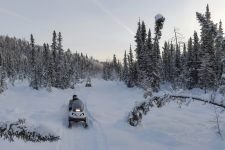 Always hopeful that he would run across a caribou, wary of the terrible possibility of running across a starving ‘winter bear’, he slung his rifle across his back. His oak military snowshoes clacked as he shuffled down the bank onto the lake to follow the nearly invisible curving trail skirting bank willows in the lee of the prevailing winter winds. There had been several days now since the cold-snap and he expected to see promising fresh sign of moving animals. Nate eased into a steady stride that would get him to the small inlet creek at the base of the ridge in a half hour or so. Squinting toward the outline of the ridge gauzed by clouds, and the first small dancing flakes touching his cheeks, comforted him.
Always hopeful that he would run across a caribou, wary of the terrible possibility of running across a starving ‘winter bear’, he slung his rifle across his back. His oak military snowshoes clacked as he shuffled down the bank onto the lake to follow the nearly invisible curving trail skirting bank willows in the lee of the prevailing winter winds. There had been several days now since the cold-snap and he expected to see promising fresh sign of moving animals. Nate eased into a steady stride that would get him to the small inlet creek at the base of the ridge in a half hour or so. Squinting toward the outline of the ridge gauzed by clouds, and the first small dancing flakes touching his cheeks, comforted him.
After clearing and re-scenting blown-in lynx cubbies along the lake flats with no catches or fresh sign, Nate labored up the trail angling up toward the crest of the ridge, adding three frozen marten from pole sets to his pack. The immense quiet of the late morning swallowed up his heavy exhalations, occasional chop of his trail axe and distant graawk of ravens below as he crested the ridge. Despite the expanding clouds, there were moments of lifting and parting that allowed an expansive view of the Kuuk bending southward.
Sipping cold water to rehydrate himself and the caribou pemmican he was chewing, Nate anticipated the descent down a creek valley and back onto the Kuuk, a bend above his place. Feeling the chill of sweated clothing he casually scanned, then quickly lifted his binocs from under his parka, to relocate and focus on a dark fleck on the graying expanse of downriver snow as dusk crept in.
A lone caribou or wolf. No, the approach was slow, direct and his heart lifted as he began to think it might just be a lone traveler. After a few minutes, a person with a large pack on snowshoes took form in moments of better light. Nate could not imagine who it might be as the Henderson teens always ran a few dogs with a toboggan to break out the first trail connection of the winter. Settling clouds erased the moment. Nate dropped down the ridge, his pack already heavy with seven frozen marten and his heart soaring with the anticipation of unexpected company.
You can support the San Juan Update by doing business with our loyal advertisers, and by making a one-time contribution or a recurring donation.
Categories: Freezer Burned










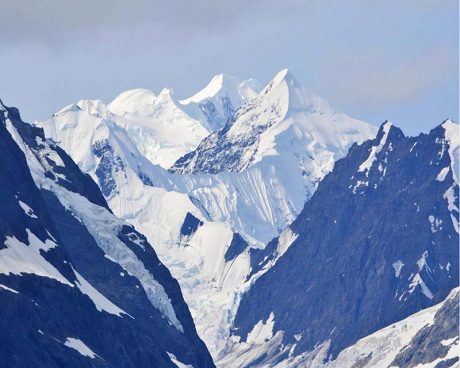
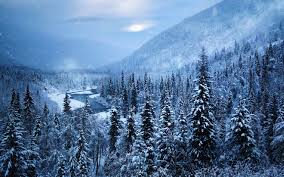
No comments yet. Be the first!
By submitting a comment you grant the San Juan Update a perpetual license to reproduce your words and name/web site in attribution. Inappropriate, irrelevant and contentious comments may not be published at an admin's discretion. Your email is used for verification purposes only, it will never be shared.